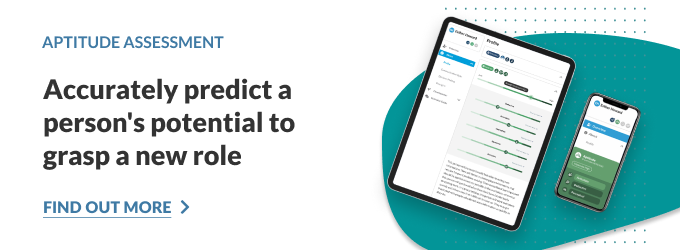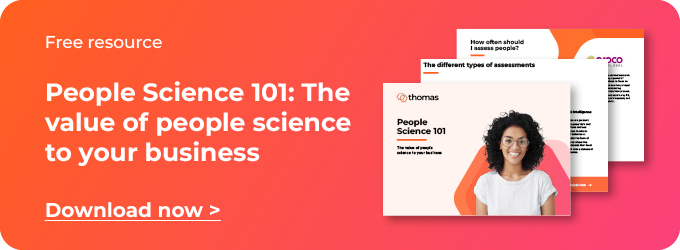It’s common to confuse aptitude assessments with IQ tests but they are very different methods of appraisal which deliver very different results.
Simply put, an IQ (Intelligence Quotient) test measures statistically how intelligent a person is while an aptitude (General Intelligence) test measures how well that person can apply their intelligence to different scenarios.

Which type of intelligence matters in recruitment?
That depends what you’re recruiting for. If you want to be sure of hiring a very clever candidate, you might want them to sit an IQ test. But if you want to hire someone who can join your business and quickly grasp the requirements of the role, adapt to new challenges and drive change through the organisation then you’ll want a candidate with a high level of aptitude.
Similarly, we can’t think of a situation when you might go looking for a particularly unintelligent person to join your team. But certain roles might suit an employee who displays low aptitude – perhaps a very methodical or repetitive role.
How do IQ tests and aptitude assessments work?
IQ tests contain a variety of questions around different areas including abstract reasoning, arithmetic, vocabulary and general knowledge. There are many IQ test providers who use their own structure and scoring methods, however, the high IQ society MENSA will only accept results from selected tests such as Cattell III B, Culture Fair, Ravens Advanced Matrices, Ravens Standard Matrices, Wechsler Scales and Stanford Binet [1]. IQ is not something that is generally measured as part of a recruitment process as it’s not a useful indicator of trainability or a candidate’s potential for success in a role.
A recruitment aptitude test on the other hand, provide an understanding of an individual’s capabilities and likelihood of responding positively to development opportunities. They are, therefore, an excellent measure of how well a potential candidate will be able to hit the ground running in a new role, how quickly they will deliver value and how far they can be developed within the organisation. In an aptitude assessment, each answer and corresponding response counts towards an easy-to-interpret representation of how quickly a person can grasp new information and which cognitive skills they are particularly strong in.

Thomas’ Aptitude assessment
The Thomas Aptitude assessment consists of five online tests of simple cognitive abilities that rely on processes such as thought, language, decision making, learning and memory.
Our assessment, also known as GIA, covers individuals’ abilities to reason (Reasoning), detect errors (Perceptual Speed), process numbers (Number Speed & Accuracy), process words (Word Meaning) and process visual information (Spatial Visualisation). It was developed over a 15 year period by Dr Peter Dann in the Human Assessment Laboratory at the University of Plymouth. Thomas integrated the assessment into its product suite in 2006.
This month, we’re delighted to announce that Aptitude is now available alongside our Behaviour assessment on our new platform, Thomas Assess. While the assessment remains the same and is still built on our tried-and-tested data-driven psychometric science, delivery of the assessment is slightly different.
The new platform empowers HR and departmental managers without any background or accreditation in psychometrics to obtain useful content and insight into candidates and employees, with no prior training required. It also enables users to create an ideal job profile in just a few clicks which candidates can then be compared against to ensure recruiters are objectively identifying the best-fit applicants for the role.
How can Aptitude assessments help your business thrive?
If you’re looking to implement succession planning or redeploy internal skills, aptitude assessments can help you recognise the right talent in the business to cultivate. They’re also a useful tool for delivering predictive analytics for bolstering predictive hiring models.
When you’re reviewing job applications and CVs, it’s difficult to know which candidate is most likely to succeed in the role and fit within the company. Aptitude assessments can help in identifying candidates who:
- Will quickly learn and retain new skills and procedures
- Have the potential to drive and manage change
- Will respond positively to development opportunities and activities
You can use the resulting content to:
- Understand what level of challenge is appropriate to each person
- Motivate and engage your workforce
- Predict a candidate’s potential for success
Read more about our assessments on our website, and download our manifesto for guidance on increasing employee productivity and driving your organisation to success.

Sources:




